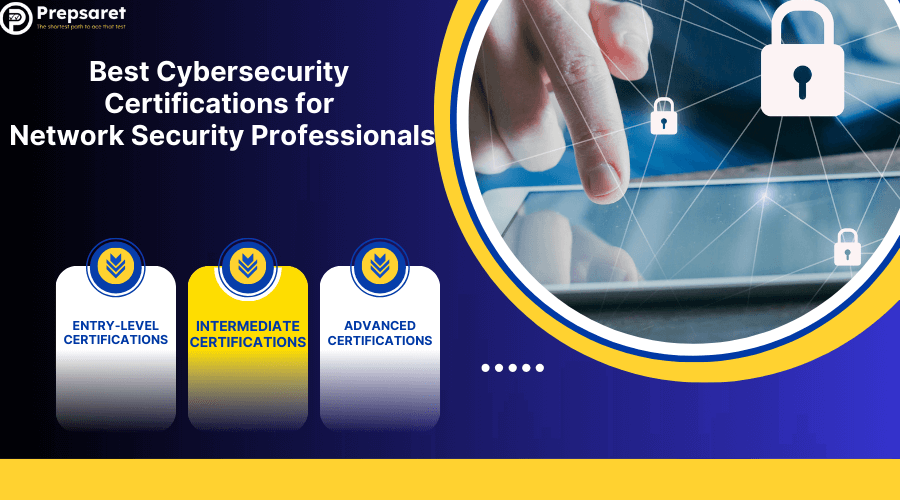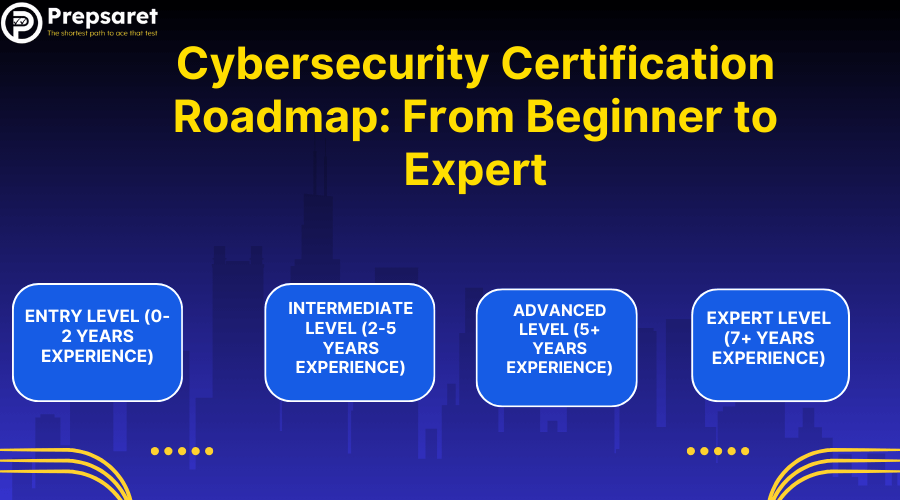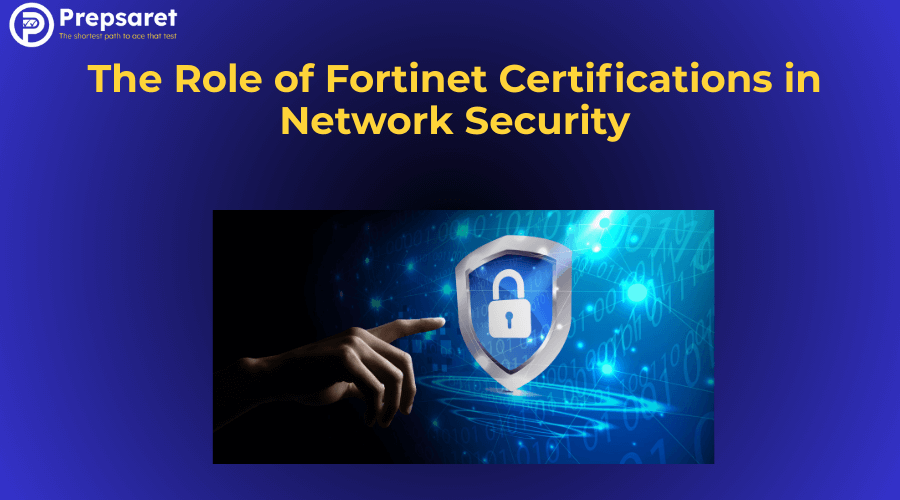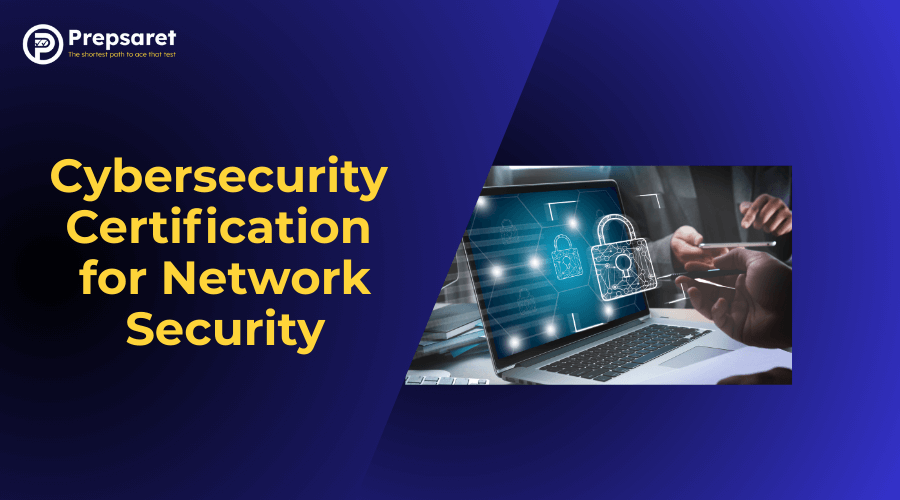In today’s digital age, the importance of safeguarding networks has never been more critical. As cyber threats evolve, so does the demand for skilled professionals equipped to protect sensitive information. Earning a cybersecurity certification for network security not only validates your expertise but also propels your career forward in this dynamic field.
These certifications bridge the cybersecurity skills gap, ensuring that organizations have the talent needed to defend against cyber adversaries.
If you are preparing for certifications like CompTIA Security+, resources from platforms such as Prepsaret can be invaluable in your study journey.
The Role of Network Security in Cybersecurity
Network security forms the backbone of any organization’s digital protection strategy, creating the first line of defense against cyber threats.
Network security professionals are the unsung heroes working behind the scenes to ensure data travels safely across networks, implement robust firewalls, monitor suspicious activities, and respond to potential breaches before they cause damage.
As cyber attacks become more sophisticated, the demand for specialists with verified network security certification continues to grow exponentially.
The landscape of IT security certifications is diverse and constantly evolving to address new challenges in the field. These certifications validate your expertise in specific areas of network security, from implementing secure network architectures to responding to incidents when they occur.
With the right IT security certifications under your belt, you’ll be equipped to:
- Design secure network infrastructures
- Implement effective security controls
- Troubleshoot security issues in real-time
- Stay ahead of emerging threats
- Speak the universal language of cybersecurity across organizations
Best Cybersecurity Certifications for Network Security Professionals

Choosing the right certification path can significantly impact your career trajectory in network security. The best cybersecurity certification for network security will depend on your current experience level, career goals, and the specific area of network security you wish to specialize in.
Here are the best certifications for network security professionals in 2025, categorized by skill level and career goals:
Entry-Level Certifications
- CompTIA Security+
- Focuses on foundational security concepts such as threats, vulnerabilities, cryptography, and access control.
- Ideal for newcomers to network security.
- CompTIA Network+
- Covers networking fundamentals, including routing, switching, and basic network security principles.
- A great starting point for IT professionals transitioning into cybersecurity.
Intermediate Certifications
- Certified Ethical Hacker (CEH)
- Specializes in ethical hacking and penetration testing techniques to identify vulnerabilities in networks.
- Suitable for professionals aiming to work in offensive security roles.
- Cisco Certified CyberOps Associate
- Focuses on cybersecurity operations and monitoring tools for detecting and responding to threats.
- Ideal for those interested in SOC analyst roles.
Advanced Certifications
- Certified Information Systems Security Professional (CISSP)
- Validates expertise in designing, implementing, and managing comprehensive security programs.
- Recommended for experienced professionals in senior security roles.
- Fortinet Certified Professional: Network Security
- Concentrates on Fortinet products, including FortiOS and specialized hardware/software solutions for mitigating cybersecurity threats.
- Perfect for professionals working with Fortinet technology.
- Palo Alto Networks Certified Network Security Engineer (PCNSE)
- Demonstrates advanced skills in configuring and securing Palo Alto Networks products.
- Valuable for engineers designing complex security infrastructures.
Specialized Certifications
- Certified Cloud Security Professional (CCSP)
- Focuses on securing cloud environments, including architecture, design, and operations.
- Essential for professionals working with cloud platforms.
- AWS Certified Advanced Networking – Specialty
- Tailored to network engineers with expertise in architecting advanced networking solutions on AWS platforms.
- Includes knowledge of DDoS protection and intrusion detection systems.
Choosing the right certification depends on your career stage and goals:
- Beginners should start with vendor-neutral certifications like CompTIA Security+ or Network+.
- Intermediate professionals can pursue CEH or vendor-specific certifications like Cisco CyberOps Associate.
- Advanced certifications like CISSP or specialized credentials such as CCSP are ideal for experienced experts aiming for leadership roles.
These certifications enhance employability, validate skills, and prepare professionals to tackle evolving cyber threats effectively
How to Become Certified in Cybersecurity for Network Security
Learning how to become certified in cybersecurity for network security doesn’t have to be overwhelming.
First, assess your current skill level honestly. If you’re new to the field, look into cyber security certifications for beginners like CompTIA Security+ or Network+. These certifications will build your foundation without overwhelming you with advanced concepts right away.
Next, create a study plan that works with your schedule. Most certification exams require 60-120 hours of preparation, depending on your background knowledge.
Leverage online resources, study guides, practice tests, and consider enrolling in hands-on cybersecurity training courses that provide practical experience.
Speaking of hands-on training, don’t underestimate its importance! Theory alone won’t cut it in the real world of cybersecurity.
Hands-on cybersecurity training courses let you practice in simulated environments, where you can make mistakes and learn from them without risking actual systems.
Here’s a simple roadmap to get certified:
Assess your current knowledge and experience
- Identify your strengths and weaknesses
- Determine which certification aligns with your career goals
- Consider your current technical background
Select the right certification
- For beginners, focus on cyber security certifications for beginners like CompTIA Security+
- For those with experience, consider more specialized certifications
- Research certification requirements, exam formats, and passing scores
Create a study plan
- Allocate sufficient time for preparation
- Gather recommended study materials
- Set realistic milestones to track your progress
Engage in practical learning
- Enroll in hands-on cybersecurity training courses
- Set up home labs to practice concepts
- Participate in capture-the-flag competitions and security challenges
Take practice exams
- Familiarize yourself with the exam format
- Identify knowledge gaps
- Improve time management skills
Schedule and take the certification exam
- Choose a convenient date and location
- Review exam-day requirements
- Arrive prepared and rested
Maintain your certification
- Complete continuing education requirements
- Stay updated on the latest security trends
- Consider pursuing advanced certifications
Remember, certification is not just about passing an exam—it’s about truly understanding the concepts so you can apply them in real-world scenarios.
Cybersecurity Certification Roadmap: From Beginner to Expert

Navigating the complex landscape of network security certifications requires a strategic approach. A well-planned cybersecurity certification roadmap can help you progress systematically from entry-level to expert status.
Entry Level (0-2 years experience):
- CompTIA Security+
- Microsoft Security, Compliance, and Identity Fundamentals
- Cisco Certified CyberOps Associate
Intermediate Level (2-5 years experience):
- Certified Ethical Hacker (CEH)
- Fortinet Certified Professional (FCP)
- GIAC Security Essentials (GSEC)
Advanced Level (5+ years experience):
- Certified Information Systems Security Professional (CISSP)
- Fortinet Certified Solution Specialist (FCSS)
- Certified Information Security Manager (CISM)
Expert Level (7+ years experience):
- Fortinet Certified Expert (FCX)
- GIAC Security Expert (GSE)
- Certified Information Systems Auditor (CISA)
Most certifications require passing proctored cybersecurity exams to validate your knowledge. These exams are typically administered in secure testing centers or through online proctoring services that monitor your environment to maintain exam integrity.
When preparing for these exams, remember that each level builds upon knowledge gained in previous certifications.
The journey from beginner to expert isn’t just about collecting credentials—it’s about developing a comprehensive understanding of network security principles and practices.
Understanding the Cost of Cybersecurity Certification for Network Security
When planning your certification journey, it’s important to consider the cost of cybersecurity certification for network security. The investment varies widely depending on the certification level, provider, and additional preparation resources
Entry-level certifications like CompTIA Security+ cost around $404 for the exam, while advanced certifications like CISSP can run up to $749.
And that’s just for the exam itself! When calculating the total cybersecurity certification for network security cost, don’t forget to factor in:
- Study materials (books, courses, practice tests)
- Training bootcamps (optional but helpful)
- Renewal fees (most certifications require renewal every 3-5 years)
- Time investment (your time has value too!)
On a tight budget? Look into free cybersecurity certification for network security options. While truly free certifications with industry recognition are rare, there are cost-effective alternatives:
- Google’s Cybersecurity Certificate
- CompTIA Security+ (Affordable through Prepsaret)
- IBM Cybersecurity Analyst Professional Certificate
- Free training resources from vendors like Cisco and Microsoft
Many employers also offer tuition reimbursement for relevant cybersecurity training programs, so it’s worth checking if your company will cover some or all of the costs.
Consider these cybersecurity training programs as an investment in your future earning potential—many certified professionals report salary increases of 15-30% after certification.
Advanced Certifications for Network Security Careers
Once you’ve established yourself in the field, it’s time to consider advanced network security certifications that can elevate you to senior positions. These certifications are not for the faint of heart—they require significant experience and in-depth knowledge of complex security concepts.
Some of the most prestigious advanced network security certifications include:
- Certified Information Systems Security Professional (CISSP)
- Certified Information Security Manager (CISM)
- Offensive Security Certified Expert (OSCE)
- GIAC Security Expert (GSE)
For those with a CISSP certification, maintaining your credential is an ongoing process. CISSP credential maintenance through certifications requires earning Continuing Professional Education (CPE) credits regularly.
You’ll need to earn and report 120 CPE credits during each three-year cycle to keep your certification active.
Speaking of ongoing education, Continuing Education Units (CEUs) for cybersecurity professionals are essential for staying current in this rapidly evolving field. Many certification bodies require CEUs to maintain your credentials, which can be earned through:
- Attending industry conferences
- Participating in webinars
- Publishing articles or research
- Contributing to open-source security projects
- Completing additional training or certifications
These requirements ensure that certified professionals stay up-to-date with the latest threats, technologies, and best practices in the ever-changing cybersecurity landscape.
Find Out: Best Cybersecurity Certification
Highest-Paying Cyber Security Certifications
If salary potential is a primary motivator, focusing on highest-paying cyber security certifications can significantly boost your earning power.
According to recent industry surveys, these certifications consistently rank among the highest-paying cyber security certifications:
- Certified Information Systems Security Professional (CISSP): $150,000+ average salary
- Certified Information Security Manager (CISM): $145,000+ average salary
- Certified Ethical Hacker (CEH): $115,000+ average salary
- GIAC Security Expert (GSE): $140,000+ average salary
- Offensive Security Certified Professional (OSCP): $120,000+ average salary
What makes these certifications so valuable?
They validate not just technical knowledge but also your ability to apply that knowledge in complex, real-world scenarios. They demonstrate your commitment to the field and your ability to understand security from both technical and business perspectives.
It’s worth noting that salary potential varies by:
- Geographic location
- Years of experience
- Industry sector
- Company size
- Additional skills and certifications
While these certifications can open doors to higher-paying positions, remember that practical experience, soft skills, and specialized knowledge in high-demand areas like cloud security or IoT security also play crucial roles in determining your market value.
Check Out: Cybersecurity Salary
The Importance of Cybersecurity Certifications for Career Advancement
Wonder why experienced professionals still pursue cybersecurity certifications when they already have years of hands-on experience? The answer lies in the tangible cybersecurity certification benefits for career advancement.
Let’s be real—in today’s competitive job market, experience alone might not be enough to stand out. Cybersecurity certifications serve as objective validation of your skills, helping you:
- Pass through automated applicant tracking systems that screen for specific credentials
- Demonstrate your commitment to professional development
- Validate your expertise to employers who may not be technical experts themselves
- Qualify for positions that list certifications as minimum requirements
- Negotiate higher salaries based on industry-recognized credentials
The cybersecurity certification benefits for career advancement extend beyond just landing a job. They can help you:
- Move into leadership positions
- Shift to specialized roles that may be otherwise inaccessible
- Transition between industries more easily
- Build credibility with clients and stakeholders
- Stay relevant in an ever-evolving field
Many hiring managers use certifications as a filtering mechanism when faced with numerous applicants.
Having the right credentials ensures you don’t get eliminated from consideration before you even get a chance to interview.
The Role of Fortinet Certifications in Network Security

In the specialized area of network security solutions, the Fortinet NSE certification program has established itself as an industry leader. This eight-level certification path provides a comprehensive framework for validating expertise in Fortinet’s security products and solutions.
The program begins with foundational knowledge in levels 1-3, progresses to technical product knowledge in levels 4-6, and culminates with advanced solution and architectural expertise in levels 7-8.
The highest level, Fortinet Certified Expert (FCX), represents the pinnacle of Fortinet expertise.
Benefits of Fortinet certifications include:
- Specialized knowledge: Deep understanding of Fortinet’s security ecosystem
- Practical skills: Hands-on experience with widely-used security solutions
- Career progression: Clear path from entry-level to expert status
- Industry recognition: Acknowledgment of specialized expertise
- Employer preference: Many organizations specifically seek Fortinet-certified professionals
For network administrators working in environments with Fortinet products, these certifications provide a direct path to increased responsibility and recognition.
Many organizations prioritize certified professionals for deployment, management, and troubleshooting of their Fortinet security infrastructure.
NICE Framework in Network Security
The National Initiative for Cybersecurity Education (NICE) Framework, developed by the National Institute of Standards and Technology (NIST), provides a common language for describing cybersecurity work. The NICE framework job roles in cybersecurity categorize security positions into seven categories:
- Securely Provision
- Operate and Maintain
- Oversee and Govern
- Protect and Defend
- Analyze
- Collect and Operate
- Investigate
Network security professionals typically fall into the “Protect and Defend” category, which includes roles like:
- Network Security Specialist
- Vulnerability Assessment Analyst
- Cyber Defense Infrastructure Support Specialist
- Cyber Defense Analyst
Understanding these standardized NICE framework job roles in cybersecurity can help you:
- Identify which certifications align with your desired career path
- Communicate your skills effectively to potential employers
- Develop targeted skills based on industry-recognized role descriptions
- Create a career development plan with clear progression paths
Many certification providers now map their credentials to specific NICE framework roles, making it easier to determine which certifications will be most valuable for your particular career objectives in network security.
Continue Reading: Cybersecurity Jobs
FAQs
Is Network+ Or Security+ Better?
Security+ is better for cybersecurity careers, focusing on security practices. Network+ provides a solid networking foundation.
Do I Need CCNA For Cyber Security?
CCNA is not necessary but beneficial. It provides valuable networking knowledge that can enhance cybersecurity skills.
Which Cyber Security Certification Is Best?
The best certification depends on your career level. CompTIA Security+ is ideal for beginners, while CISSP or CISM are better for advanced professionals.
Should I Do CCNA Or Security+?
Start with Security+ for cybersecurity. If you want a strong networking foundation, begin with CCNA. Both certifications are valuable.
Is Network Security In High Demand?
Yes, network security is in high demand. The cybersecurity job market is rapidly growing with more positions available than qualified professionals.

